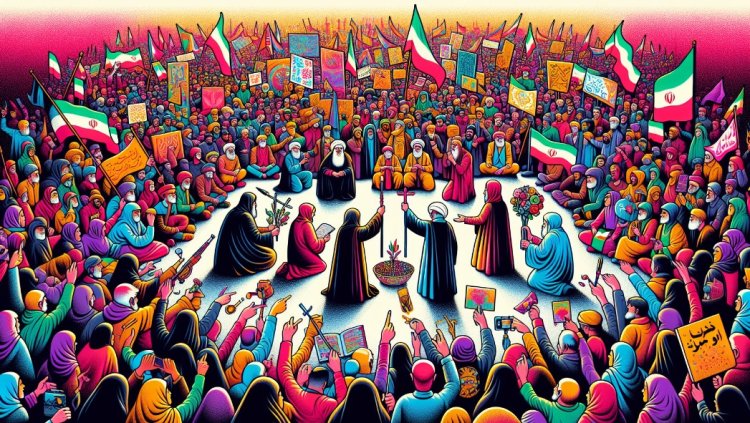The Transformation of Iran: From Islamic Nation to a Nation Seeking Change
Unveiling the evolving landscape of Iran: Explore its journey from an Islamic state to a society navigating complex transitions. Delve into political shifts, social movements, and aspirations for a changing future.

Introduction
Welcome to our blog on the transformation of Iran! In this section, we will provide an overview of the topic, give a brief background on Dr. Hormoz Shariat, discuss the current situation in Iran, and explain the importance of understanding Iran's transformation.
Iran, officially known as the Islamic Republic of Iran, has undergone significant changes in recent years. Dr. Hormoz Shariat, the president of Iran Alive Ministries, has been at the forefront of these changes. With 23 years of experience broadcasting the gospel into Iran via satellite television, Dr. Shariat has witnessed firsthand the transformation taking place in the country.
Contrary to popular belief, Iran is no longer an Islamic nation. A scientific survey conducted by two university professors revealed that less than one-third of Iranians still believe in Islam. Another one-third either believe in a different religion or believe that God is not relevant to their lives. The remaining one-third are exploring various religions, including Christianity.
Widespread protests are a defining feature of the current situation in Iran. A desire for change and a rejection of the oppressive Islamic regime are what have driven these protests. People from all walks of life, including women, have taken to the streets to demand freedom and a break from the religious restrictions imposed by the government.
Understanding Iran's transformation is crucial for several reasons. Firstly, it provides insight into the changing dynamics of religious belief in the country. Secondly, it sheds light on the struggles faced by Iranians and the importance of supporting their quest for freedom. Lastly, it highlights the power of love and unity in overcoming the spirit of fear perpetuated by Islam.
Iran's Changing Religious Landscape
The transformation of Iran is not only evident in the political and social aspects of the country but also in its religious landscape. Many Iranians are rejecting Islam and searching for alternative beliefs. Personal experiences, academic studies, and Dr. Hormoz Shariat's observations all support this shift in religious beliefs.
The Personal Experience of the Mom with Her Son's Transformation
One of the compelling personal experiences that showcases this transformation is the story of a mother whose son underwent a remarkable change. The son's behavior improved, he became respectful, and his grades even got better. It was later discovered that he had secretly embraced Christianity, which had a profound impact on his life. This personal testimony highlights how individuals are finding solace and transformation in alternative belief systems.
Dr. Shariat's claim that Iran is no longer an Islamic nation
Dr. Hormoz Shariat, the president of Iran Alive Ministries, boldly states that Iran is no longer an Islamic nation. This claim is not based on speculation but on his daily interactions with the people of Iran. He has witnessed the rejection of Islam and the growing interest in other religions, including Christianity. His insights provide valuable evidence of the changing religious landscape in the country.
Evidence of a Scientific Survey
Two university professors' scientific study supports the idea that Iran is no longer an Islamic country. The survey asked over 50,000 Iranians about their religious beliefs, and less than one-third identified as Muslims. Another one-third expressed a lack of belief in God or the relevance of religion in their lives. The remaining one-third explored various religions, with Christianity being one of the prominent alternatives. This scientific survey provides statistical evidence of the shifting religious dynamics in the country.
The Rejection of Islam and the Search for Alternative Beliefs
The rejection of Islam in Iran is not limited to a few individuals but is a growing sentiment among the population. Iranians are actively searching for alternative beliefs, including New Age religions, Eastern religions, and even secularism. The desire for freedom and a break from the religious restrictions imposed by the government have fueled this search. Iranians are longing for personal autonomy in matters of faith and exploring different paths to find spiritual fulfillment.
In conclusion, the religious landscape of Iran is undergoing a significant transformation. The personal experiences of individuals, the insights of Dr. Hormoz Shariat, scientific surveys, and the rejection of Islam all point to a changing dynamic in the country. As Iranians continue to explore alternative beliefs, it is essential to understand and support their quest for freedom and spiritual fulfillment.
Factors Leading to the Change
The transformation of Iran from an Islamic nation to a nation seeking change is the result of several key factors. These factors have played a significant role in shaping the current situation in the country and have contributed to the loss of support for the government and the rejection of Islam.
The Role of the Government in Implementing Islam
Iran has been under the rule of Islamic clerics for more than 40 years, making it the only nation in the world with such a government. The government has implemented Islamic laws in every aspect of life, including personal, political, and social matters. However, this comprehensive implementation of Islam has led to a sense of oppression and restrictions among the Iranian population.
The Comprehensive Nature of Islamic Laws
Islamic laws cover various aspects of life, from religious practices to personal behavior, including laws related to clothing, hygiene, and even the private lives of individuals. The deep intrusion of Islam into every area of life has created a desire for freedom and autonomy among Iranians, who are seeking to break free from the religious restrictions imposed by the government.
The Loss of Support for the Government
Despite the government's efforts to enforce Islamic laws, it has lost the support of a significant portion of the population. A scientific survey conducted by two university professors revealed that less than one-third of Iranians identify as Muslims, while another one-third express a lack of belief in God or the relevance of religion in their lives. This loss of support is a clear indication of the growing disillusionment with the government and its religious policies.
The deep-rooted rejection and hatred of Islam
Iranians' rejection of Islam is not limited to a few individuals but is a widespread sentiment among the population. Iranians are actively searching for alternative beliefs and exploring various religions, including New Age religions, Eastern religions, and even secularism. This rejection and hatred of Islam are deeply rooted and have fueled the desire for change and freedom in the country.
In conclusion, the transformation of Iran from an Islamic nation to a nation seeking change is influenced by several factors. The role of the government in implementing Islam, the comprehensive nature of Islamic laws, the loss of support for the government, and the deep-rooted rejection and hatred of Islam have all contributed to the current situation in Iran. Understanding these factors is crucial to comprehending the dynamics of religious belief in the country and supporting the quest for freedom and spiritual fulfillment among Iranians.
The Significance of the Protests
The protests in Iran hold great significance in understanding the current situation in the country and the desire for change among the Iranian population. Here are a few important points to consider:
Overview of the protests in Iran
The protests in Iran began after the death of a young woman in police custody. The widespread anger and frustration over her death sparked a wave of protests throughout the country.
The catalyst for the protests
The protests were not only a response to the death of the young woman but also a result of years of dissatisfaction with the oppressive Islamic regime. Iranians have been seeking change and freedom from religious restrictions imposed by the government.
The widespread nature of the protests
The protests were not limited to a specific region or demographic. People from all walks of life, including women, took to the streets to demand freedom and change. This widespread participation highlights the deep-rooted desire for a transformation in the country.
The slogans against the government and Islam
One of the notable aspects of the protests was the slogans chanted against the government and Islam. Iranians expressed their rejection of the Islamic regime and called for greater freedom and autonomy in matters of faith.
The significance of these protests cannot be overstated. They represent a powerful and collective voice of the Iranian people, demanding change and breaking free from the religious restrictions imposed by the government. Understanding the reasons behind the protests and the sentiments expressed by the protesters is crucial to supporting their quest for freedom and a better future.
The Role of Women in the Movement
Women in Iran have historically faced oppression and discrimination. The Islamic laws implemented by the government have greatly restricted their rights and freedoms. However, in recent years, women have emerged as leaders in the movement for change in Iran.
Women have been at the forefront of the protests, demanding freedom and equality. Their involvement and activism have played a significant role in shaping the current situation in the country. Despite the risks and challenges they face, Iranian women continue to fight for their rights and challenge the oppressive regime.
The significance of women leading the movement goes beyond their fight for gender equality. It represents a symbolic shift in power dynamics and challenges traditional gender roles. By standing up against the government and demanding change, women are breaking free from the religious restrictions imposed upon them.
There is a direct correlation between the oppression that Iranian women experience and the grace they display in the face of hardship. Despite being subjected to discrimination, violence, and imprisonment, Iranian women continue to persevere and fight for their rights with grace and resilience.
One of the battlegrounds in this movement is the issue of the covering or hijab. The covering has become a symbol of the government's control over women's bodies and their freedom of expression. By challenging the mandatory wearing of the hijab, women are challenging the government's authority and asserting their right to personal autonomy.
In conclusion, women have played a crucial role in the movement for change in Iran. Their leadership, resilience, and determination have been instrumental in shaping the current situation in the country. As they continue to fight for their rights and challenge oppressive norms, they inspire others with their grace and courage.
The Growth of Other Religions
While the rejection of Islam in Iran has led to a significant decrease in the number of Muslims in the country, it has also given rise to the growth of other religions. Iranians who have turned away from Islam are exploring alternative beliefs and seeking spiritual fulfillment in various ways. Here are some key points about the growth of other religions in Iran:
The Rejection of All Religions
For many Iranians, the rejection of Islam has led to a rejection of all religions. They have become disillusioned with the oppressive nature of religious institutions and are seeking personal autonomy in matters of faith. A desire for freedom and a break from government-imposed religious restrictions are the driving forces behind this rejection of all religions.
The Attraction of New Age and Secular Beliefs
As Iranians search for alternative beliefs, many are attracted to New Age and secular beliefs. New Age religions offer a more individualistic and spiritual approach to faith, while secular beliefs provide a rejection of organized religion altogether. Both of these belief systems appeal to Iranians who are seeking personal autonomy and spiritual fulfillment outside of traditional religious institutions.
The Desire for a Secular Democracy
A significant number of Iranians are advocating for a secular democracy in the country. They believe that separating religion from the state is necessary for personal freedom and the protection of individual rights. A demand for greater personal autonomy in matters of faith and a rejection of the Islamic regime's religious restrictions are the driving forces behind the desire for a secular democracy.
The Unique Case of Christianity
Christianity has emerged as a prominent alternative belief system for Iranians. Many Iranians have embraced Christianity and found solace and transformation in their newfound faith. The growth of Christianity in Iran is a testament to the rejection of Islam and the search for spiritual fulfillment among Iranians. It is important to note that while Christianity is growing in Iran, it still faces persecution and challenges from the government.
In conclusion, the rejection of Islam in Iran has led to the growth of other religions as Iranians seek alternative beliefs and spiritual fulfillment. The rejection of all religions, the attraction of New Age and secular beliefs, the desire for a secular democracy, and the unique case of Christianity are all contributing factors to the growth of other religions in the country. It is crucial to understand and support Iranians in their quest for spiritual fulfillment and freedom.
The Unusual Lack of Persecution
When it comes to the lack of persecution for those who reject Islam, Iran stands out among other Islamic countries. While in many Islamic countries, leaving Islam can result in persecution from family members, in Iran, the persecution primarily comes from the government rather than family members.
This unique situation can be attributed to the political motivations behind the persecution. Islamic clerics run Iran's government, which has incorporated Islamic law into every aspect of daily life. However, this comprehensive implementation of Islam has led to a sense of oppression and restrictions among the Iranian population. As a result, many Iranians have rejected Islam and are actively searching for alternative beliefs.
When Iranians convert to Christianity, they often receive positive reactions from their families. In many cases, the families either come to Christ themselves or express support for their loved one's decision. This is a stark contrast to other Islamic nations, where leaving Islam can lead to severe consequences for family members.
The lack of persecution from family members is a testament to the growing disillusionment with Islam among the Iranian population. Iranians have witnessed the negative effects of Islamic rule and have consciously chosen to reject the religion. They are seeking personal autonomy and spiritual fulfillment outside of the restrictions imposed by the government.
In conclusion, Iran's unusual lack of persecution for those who leave Islam sets it apart from other Islamic nations. The persecution primarily comes from the government rather than family members, and families often react positively to conversion. This unique situation reflects the growing rejection of Islam and the search for alternative beliefs among the Iranian population.
Miraculous Life Transformations
In Iran, there are numerous stories of dramatic life changes that have occurred as a result of individuals embracing Christianity. One such story involves a mother who noticed a remarkable transformation in her son's behavior. He became respectful, his grades improved, and he even helped out around the house. When confronted, he revealed that he had secretly become a Christian, which had a profound impact on his life.
These stories of personal transformations highlight how individuals are finding solace and a sense of purpose in alternative belief systems. It is not uncommon for family members to also come to Christ as a result of witnessing these transformations. The love and unity exhibited by Christians in Iran are often powerful testimonies that inspire others to seek spiritual fulfillment and freedom.
The impact of lifestyle changes on others is not limited to individual families. The growth of Christianity in Iran has led to the formation of instant house churches. In some cases, entire households and communities have come to Christ through the influence of one individual. This rapid growth highlights the hunger for truth and the rejection of Islam among Iranians.
Furthermore, the rejection of Islam in Iran has also led to the exploration of other religions. Iranians are actively searching for alternative beliefs, including New Age religions, Eastern religions, and even secularism. The desire for freedom and a break from the religious restrictions imposed by the government have fueled this search.
In conclusion, Iran's transformation is marked by miraculous life changes, familial conversions, and the impact of lifestyle changes on others. The rejection of Islam and the exploration of alternative beliefs demonstrate the longing for personal autonomy and spiritual fulfillment among Iranians. These stories serve as powerful reminders of the power of love, unity, and the search for truth amidst adversity.
The Power of Love in Ministry
Amid the transformation taking place in Iran, one powerful force stands out—the power of love in ministry. Love plays a crucial role in various aspects of the ministry and has a profound impact on the Iranian people.
The Importance of Trust and Love in Ministry
To effectively reach and impact the Iranian people, trust and love are essential. Dr. Hormoz Shariat's ministry, Iran Alive, has gained the trust of the Iranian population through their genuine love and care for them. By demonstrating love and compassion, the ministry has been able to connect with the people on a deep level and establish meaningful relationships.
The Impact of Genuine Love on the Iranian People
The genuine love shown by Iran Alive and other ministries has had a profound impact on the Iranian people. It has provided them with a sense of hope, support, and belonging. Many individuals who have embraced Christianity have experienced remarkable life transformations, leading to improved relationships, better behavior, and a newfound sense of purpose. These personal testimonies serve as powerful evidence of the transformative power of love.
The spiritual war and the power of love
Love is a potent weapon in the spiritual battle going on in Iran against the Islam-based spirit of fear. Love breaks down barriers, overcomes prejudices, and fosters unity among believers. It is through love that Christians can reach out to their fellow Iranians, plant seeds of faith, and create a safe space for exploration and spiritual growth.
The Role of Love in Casting Out Fear
Fear is a prominent feature in the lives of many Iranians due to the oppressive Islamic regime. However, love has the power to cast out fear and bring about freedom and transformation. Christians in Iran can foster an environment where people can openly explore their faith and free themselves from Islam's shackles of fear by showing them love and acceptance.
In conclusion, love plays a vital role in ministry in Iran. It establishes trust, brings about life transformations, battles spiritual warfare, and casts out fear. Through the power of love, Iranian believers are making a significant impact and paving the way for a nation seeking change and spiritual fulfillment.
Prayers for Iran
In the spiritual warfare in Iran, love plays a crucial role in ministry. Dr. Hormoz Shariat and Iran Alive Ministries have gained the trust of the Iranian population through their genuine love and care for them. This love has had a profound impact on the Iranian people, providing them with hope, support, and a sense of belonging.
We can pray for the spiritual warfare in Iran by:
-
I am praying for the health and safety of Dr. Hormoz Shariat and his team at Iran Alive Ministries as they continue to serve and minister to the people of Iran.
-
I am praying for the health, well-being, and protection of Iranian believers and their families, who may face persecution and challenges for their faith.
-
I am praying for unity among believers in Iran so that they may stand firm in their faith and support one another in the face of opposition.
-
I am praying for the continued growth of the church in Iran so that more Iranians may come to know Christ and experience the transformative power of His love.
-
I am praying for the political and social situation in Iran so that there may be positive change and greater religious freedom for all Iranians.
Fasting and prayer are also important in the spiritual warfare in Iran. We can join together in fasting and praying for the people of Iran, their quest for freedom, and their spiritual fulfillment. Let us lift up our prayers to God, asking for His guidance, protection, and love to be poured out on the nation of Iran and its ministry.
May our prayers and support bring hope, healing, and transformation to the people of Iran, and may they continue to experience the power of love in their lives.
Conclusion
In conclusion, the transformation of Iran from an Islamic nation to a nation seeking change is a complex process driven by various factors. The rejection of Islam and the search for alternative beliefs are prominent themes in this transformation. Iranians are exploring different spiritual paths, including New Age religions, secularism, and Christianity. The growth of other religions in Iran reflects the desire for personal autonomy and spiritual fulfillment among the population.
It is important to recognize the significance of the protests in Iran, particularly the role of women in leading the movement for change. Women have emerged as powerful agents of transformation, challenging traditional gender roles and demanding freedom and equality. Their involvement highlights the deep-rooted desire for change and the rejection of oppressive religious restrictions.
Through the power of love and ministry, Dr. Hormoz Shariat and Iran Alive Ministries have gained the trust of the Iranian people. Their genuine love and compassion have had a profound impact on individuals, providing them with hope, support, and a sense of belonging. Love has developed into a potent weapon against the Islam-based culture of fear.
Continued prayer and support are crucial in sustaining the transformation taking place in Iran. Prayers for the health and safety of Dr. Hormoz Shariat and his team, the well-being of Iranian believers, unity among believers, the growth of the church, and positive political and social change are needed. Fasting and prayer play a significant role in the spiritual warfare in Iran, and joining together in prayer can bring hope, healing, and transformation to the Iranian people.
For more information on the transformation of Iran and the work of Dr. Hormoz Shariat, please visit the Iran Alive Ministries website. There, you can find resources, testimonies, and ways to get involved in supporting the ministry. We are grateful to Dr. Hormoz Shariat for his valuable insights and his dedication to bringing the message of love and hope to the people of Iran.



 admin
admin 










